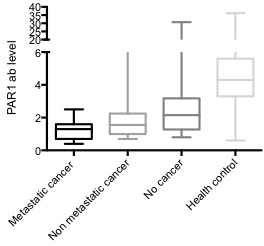Deficiency of Naturally Occurring Anti-Angiogenic Antibodies Associate With the Development of Metastatic Cancer Post Renal Transplantation and Patient Death
1Central Northern Adelaide Renal and Transplantation Service, Royal Adelaide Hospital, Adelaide, SA, Australia
2Centre for Cardiovascular Research, Charite Hospital, Berlin, Germany.
Meeting: 2015 American Transplant Congress
Abstract number: 407
Keywords: Antibodies, Kidney transplantation, Malignancy, Post-transplant malignancy
Session Information
Session Name: Concurrent Session: PTLD and Other Malignancies
Session Type: Concurrent Session
Date: Tuesday, May 5, 2015
Session Time: 2:15pm-3:45pm
 Presentation Time: 2:39pm-2:51pm
Presentation Time: 2:39pm-2:51pm
Location: Room 122-AB
We assessed the presence of naturally occurring blocking antibodies to mediators of vascularisation and metastasis in Kidney Transplant Recipients (KTR) with metastatic cancer (n=11), non metastatic cancer (n=32) and 38 KTR with no cancer history and 195 healthy controls.
The antibodies assessed were: PAR1-antibody, VEGF-A-antibody, VEGF-Receptor 1 antibody, VEGF-B antibody, VEGF-Receptor 2-Ab, EGF-Antibody and EGFR-Antibody
All KTR had stable graft function and there were no differences in immunosuppressive regimens, HLA mismatch, or duration of immunosuppression between KTR groups. KTR with metastatic cancer were significantly older than those without cancer (p=0.011). KTR with non metastatic cancer were similar in age to KTR without cancer (p=0.071). There was no correlation with age to any of the antibodies tested.
Compared to healthy controls KTR without cancer had lower levels of PAR1-ab, VEGF-R1-Ab, VEGF-B-Ab, EGF-Ab and EGFR-Ab (all p values<0.001). However KTR had similar levels VEGF-A-Ab and VEGF-R2-Ab.
KTR with non metastatic cancer had similar antibody profiles to those KTR without cancer apart from having lower levels of PAR1-abs (p=0.043). 
KTR with metastatic cancer had lower levels of antibodies to PAR1, VEGF and its receptors (all p values<0.05) compared to those with no cancer history. Levels of antibodies to EGF and its receptor were similar between all KTR groups.
These data show that KTR have lower levels of antibodies to mediators of tumour vascularisation compared to healthy controls. The reason for this is unknown but may relate to immunosuppression. KTR with metastatic cancer had further reduction in antibodies to PAR1 and the VEGF pathway but not EGF pathway.
We are assessing stored serum samples to confirm whether KTR with metastatic cancer lose these antibodies during the development of cancer or whether they historically had low levels. It is possible these antibodies could risk stratify KTR at risk of developing metastatic cancer.
To cite this abstract in AMA style:
Carroll R, Phillippe A, Catar R, Heidecke H, Dragun D. Deficiency of Naturally Occurring Anti-Angiogenic Antibodies Associate With the Development of Metastatic Cancer Post Renal Transplantation and Patient Death [abstract]. Am J Transplant. 2015; 15 (suppl 3). https://atcmeetingabstracts.com/abstract/deficiency-of-naturally-occurring-anti-angiogenic-antibodies-associate-with-the-development-of-metastatic-cancer-post-renal-transplantation-and-patient-death/. Accessed February 17, 2026.« Back to 2015 American Transplant Congress
